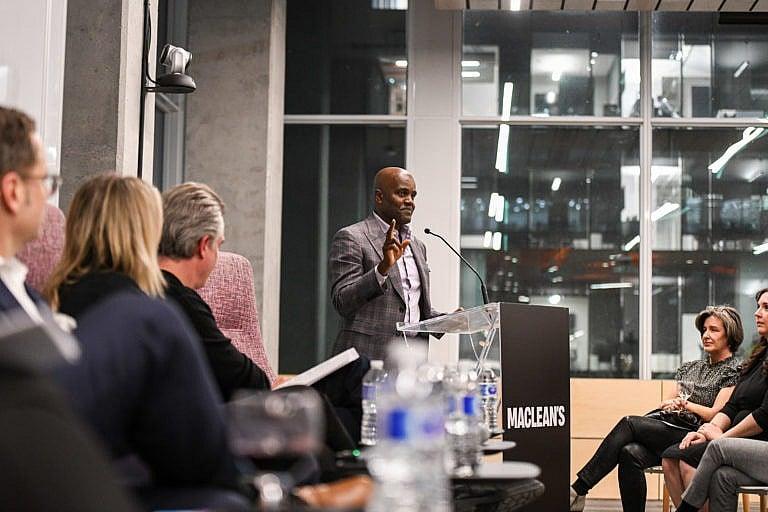Here’s what happened at the Maclean’s Ideas Summit
The inaugural Maclean’s Ideas Summit featured leading thinkers discussing the future of Canada in 2023

Wes Hall, chairman and founder of WeShall Investments Inc.; Kingsdale advisors of The BlackNorth Initiative; and dragon on CBC’s Dragons’ Den, discussing the impact of diversity and inclusion in Canada’s sectors and industries. (Photography by George Pimentel)
Share
The inaugural Maclean’s Ideas Summit, inspired by the magazine’s recent Year Ahead issue, featured leading thinkers discussing the future of Canada in 2023. The three-day in-person and virtual summit, held in partnership with signature sponsor Uber Canada, as well as the University Health Network and Colliers, included a live Q&A with Dr. David Suzuki, a fireside chat with Dr. Andrew Boozary, and a panel of Mini Talks from industry leaders on innovation in health care, business, education and more.
The summit kicked off on January 24 with a virtual webinar and live Q&A with Dr. David Suzuki, a world-renowned author and activist. Suzuki delivered a powerful call to action against climate change: “We don’t know enough to know if it’s too late, but it is very late.” He encouraged young adults to challenge old ways of thinking, reduce their carbon footprints, and protect the air, water and soil in their communities. Jason Maghanoy, the vice-president of digital solutions and business developer at SJC media, hosted the event and led the Q&A.
The second day of the summit was held on January 26, with networking, drinks and a fireside chat with Dr. Andrew Boozary from the University Health Network. Boozary discussed how the pandemic had widened existing health disparities faced by marginalized communities. He explained that the UHN prioritizes social health care, ensuring that marginalized groups have equitable access to family doctors, vaccines and public care. After an engaging audience Q&A, guests mingled and enjoyed food and drinks.


Everyone was invited back for the final event of the summit: a Mini Talk series held at OCAD University on January 30. The evening began with networking and drinks, followed by a series of speeches from top thinkers about the future of innovation in Canada. Sarah Fulford, the editor-in-chief of Maclean’s, kicked off the panel with an opening speech discussing the profound impact Maclean’s has had on the Canadian conversation.

First up was Laura Miller, the leader of public policy and communications at Uber Canada, who discussed the future of work in Canada and innovation at Uber. She urged the government to create a “new labour classification category” that provides drivers and food-delivery workers with flexibility, benefits and protection.

Wes Hall, the chairman and founder of Weshall Investments and a Dragon on CBC’s Dragon’s Den, discussed the lack of diversity in corporate Canada. “We’ve replaced white men with the same homogeneous group of people,” he said, explaining that only 6.2 per cent of the 54 per cent of women in boardrooms and senior management positions are Black or Indigenous. He urged those in positions of power and privilege to acknowledge the systemic racism that permeates all areas of society and to work towards finding long-term solutions to address it. “I am 20 times more likely to be shot dead by the police, even if I am unarmed, even though I represent less than 10 per cent of the black population in Toronto,” said Hall.

Next, the founder and principal of MASS LBP, Peter Macleod, discussed the state of democracy in Canada. He urged Canadians to take a peek into the future of responsible government. “Yes to lowering the voting age so the next generation is heard,” he said. “Yes to giving permanent residents the municipal vote…and yes to voting on a public holiday because their democracy is something to celebrate.”
Stefan Raos, head of public affairs and partnerships at Moderna Canada, said that public health will continue to innovate by embracing technology. Moderna, for example, has partnered with the government of Canada to build the first mRNA facility outside the United States, in Quebec. “This partnership is now being used as a blueprint for the rest of the world and one that other countries are planning to replicate,” says Raos.

John Duda, president of real estate management services at Colliers Canada, took to the stage to discuss the importance of building creative spaces after the pandemic to enhance productivity and wellness in the workplace. “What we have in our recent survey was that 44 per cent of businesses no longer have dedicated space for all their employees, which is a dramatic shift from before.”
The Mini Talk series ended with Ana Serrano, the president and vice-chancellor at OCAD University, who talked about the evolution of learning in Canada. She commended the education system for embracing technology and engaging students in a new environment during the pandemic. “We had a once-in-a-hundred-years opportunity to innovate like never before. We worked with determination to legitimate ways of working and living that were previously considered difficult,” says Serrano.
The summit came to a close with an opportunity for guests to enjoy cocktail hour with food provided by Urban Fare Catering Inc., and chat intimately with leaders and thinkers, as well as network among themselves.
